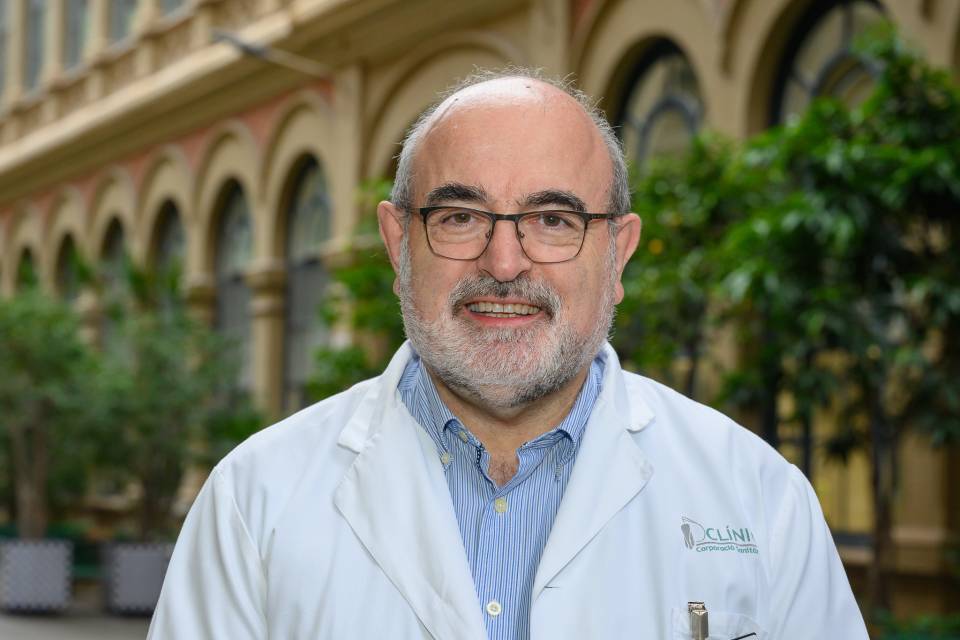After 10 years of follow-up, they show that the two strategies are similarly effective in detecting colorectal cancer and in their ability to reduce mortality associated with it.
Published in The Lancet, the study was coordinated by Dr Antoni Castells, the medical director of Hospital Clínic Barcelona, the head of the IDIBAPS research group Gastrointestinal and pancreatic oncology and CIBERehd and a professor of Gastroenterology at the University of Barcelona; and Dr Enrique Quintero, a gastroenterologist Hospital Universitario de Canarias and a professor at University of La Laguna in Tenerife. Called COLONPREV, the project was funded jointly by the Spanish Association Against Cancer (AECC) and Instituto de Salud Carlos III.
Colorectal cancer: a disease that can be prevented if detected early
Colorectal cancer is one of the most common tumours and a main cause of cancer-related deaths. It develops from precancerous lesions called polyps, which can develop into a malignant tumour if not detected and removed in time.
Early detection is key to preventing the disease or diagnosing it in its early stages, when treatment is more effective and the chances of curing it are higher. There are currently two primary screening strategies: the faecal occult blood test, which detects microscopic traces of blood indicative of precancerous lesions or tumours; and colonoscopy, which is considered the most accurate test for early detection, used to explore the colon directly and remove polyps before they become cancerous.
Compare the two screening strategies: COLONPREV study
Researchers working on the COLONPREV project, the first study in the world to compare both screening strategies, hypothesised that the faecal occult blood test, which is less invasive and more acceptable to the population, would not be less effective than colonoscopy in reducing mortality from colon and rectal cancer.
A randomised clinical trial was carried out with 57,000 men and women between 50 and 69 years of age from eight Spanish autonomous communities (Aragon, Canary Islands, Catalonia, Galicia, Madrid, Murcia, Basque Country and Comunitat Valenciana).
The participants were divided into two groups: one was invited to undergo a colonoscopy, whilst the other was invited to undergo the faecal immunochemical test (FIT) every two years (five in total). The main objective was to compare mortality rates from colorectal cancer after 10 years.
A less invasive test may be just as effective
The findings showed that participation in screening was higher in the faecal occult blood test group, at 40%, compared with the colonoscopy group, which was about 32%.
Furthermore, colorectal cancer mortality rates after 10 years were similar in both groups: 0.22% in the colonoscopy group and 0.24% in the faecal immunochemical test group. So was the incidence of these tumours. This indicates that the test is as effective as colonoscopy in reducing colorectal cancer mortality in screening programmes.
A previous article about the same project, but focused on the results obtained in the first round of the screening programme and published in the New England Journal of Medicine, showed that both strategies detected the same number of tumours, but this most recent article goes further by demonstrating that they are also equally effective in reducing mortality from colorectal cancer.
Dr Antoni Castells, who is also the president of the Executive Committee of the Hospital Clínic Barcelona Comprehensive Cancer Centre, says that ‘these findings are highly significant, as they demonstrate that the non-invasive faecal occult blood test may be a viable alternative to colonoscopy for colorectal cancer screening’.
In this sense, Dr Enrique Quintero says that ‘this could boost participation in screening programmes, since the faecal immunochemical test is more comfortable and less invasive. Implementing this test could also be more cost-effective and accessible to a larger share of the population’.
In conclusion, the study reinforces the importance of screening programmes and shows that the faecal occult blood test is a key tool for the early detection of colorectal cancer, thereby improving survival rates and reducing mortality associated with this disease.
Study reference:
Effect of invitation to colonoscopy versus faecal immunochemical test screening on colorectal cancer mortality (COLONPREV): a pragmatic, randomised, controlled, non-inferiority trial
Antoni Castells, Enrique Quintero, Luis Bujanda, Susana Castán-Cameo, Joaquín Cubiella, José Díaz-Tasende, Ángel Lanas, Akiko Ono, Miquel Serra-Burriel, Eladio Frías-Arrocha, Cristina Hernández, Rodrigo Jover, Montserrat Andreu, Fernando Carballo, Juan Diego Morillas, Dolores Salas, Raquel Almazán, Inmaculada Alonso-Abreu, Jesús M. Banales, Vicent Hernández, Isabel Portillo, Mercedes Vanaclocha-Espí, Mariola de la Vega, on behalf of the COLONPREV study investigators.
The Lancet, 27 March 2025. DOI: 10.1016/S0140-6736(25)00145-X




